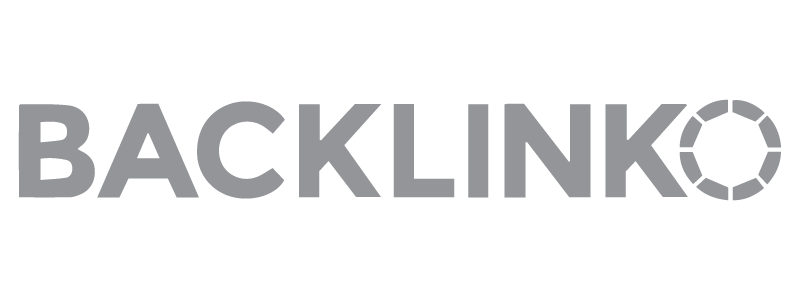If you’re planning on opening an online store, you’ll want to investigate ecommerce web hosts as part of your planning process. While hosted platforms like Shopify and BigCommerce handle the web hosting for you, if you’re building your own website with WordPress and WooCommerce, you’re on your own when it comes to picking a hosting provider.

To help make the process easier for you, we’ll cover why getting the right ecommerce hosting provider matters, what to look for as you shop around, and finally, we’ll give you 11 of the best ecommerce hosting solutions today, so you can start to narrow down your options.
Why It’s Important to Get the Best Website Hosting for Ecommerce
Your web hosting is the backbone of your ecommerce website, so you need to make sure you start with a solid foundation. You could have the best website design with all the features your customers want, but it won’t be effective without a reliable host to support it.
Site Speed
Today’s consumers are all about instant gratification. Nearly half of consumers expect your website to load within two seconds.
Beyond customer impressions, Google’s search algorithm considers site speed as a ranking factor. If the bots can’t discover and index your website quickly, the search engine takes longer to produce results.
Search engine bots branch out from your home page and crawl the links on the site map. They only have a certain amount of time to spend on each page, and if your site loads slow, then the bots may not include those pages.
User Experience
How customers experience your website is crucial for your business. Customers need to be able to access the information they need, as quickly as possible. If the site loads slow or is missing images or files, the customer will be frustrated and leave.
Security
Security is paramount online, especially for ecommerce sites. If your website isn’t encrypted with SSL, it will identify as “not secure” in the browser. This will decrease consumer confidence in your brand.
Web hosts offer security certificates to encrypt the site. With shared hosting plans, you will likely pay more for the certificate you need for your ecommerce site. If you opt for managed ecommerce hosting, this feature is likely included at no additional cost.
Hosted vs. Self-Hosted Platforms
Hosted ecommerce platforms charge a monthly fee in exchange for managing the technical aspects of your website for you. You can save a bit of money if you commit to an annual plan. Common hosted ecommerce platforms include:
- Shopify
- BigCommerce
- Wix Ecommerce
With a hosted platform, you don’t have to worry about anything other than your site content and marketing. While that’s a good thing for people who don’t have much technical knowledge, it can be restrictive for developers.
Must-Have Ecommerce Hosting Features
As you evaluate web hosts, make sure you, at a minimum, have the following features included in your chosen plan.
SSL certificate
SSL stands for secure socket layer. It’s a security technology that adds a small file to your website. It’s what makes your website secure (HTTPS vs. HTTP).
An SSL certificate encrypts information as it passes from one computer to another. It is necessary to protect your customer’s financial information.
Regular, Automated Backups
Mistakes happen, especially if you have multiple people working on your online store. Having a backup of your ecommerce site is crucial to keeping things up and running if something goes wrong.
Sure, you can manually back things up, but it’s easy to get busy and forget. If the last time you backed up your website was six months ago, you’re in trouble.
With regular, automated backups, you’re always protected if you have to roll back your site. Many ecommerce hosting companies offer nightly backups, though some only offer weekly backups. It’ll be up to you to determine if you’re okay with the backup frequency.
Staging Environment
Also known as a stage, it is a replica version of your website that you can use to test and make changes to see how they affect your website before pushing them live to your customers.
This way, you can add products to your online store and push the updates live when you’re ready. If you want to test a new plugin or theme, but you’re afraid it will break the site, or change how it looks, try things out on the staging site first.
Content Delivery Network (CDN)
A CDN stores copies of your website on multiple server locations. It pulls the content from the server closest to your website visitor, to reduce site load time and provide a better user experience.
Uptime Guarantee
If your web hosting service isn’t operational 99.9% of the time, your ecommerce store won’t be accessible all the time. Most web hosting companies have an uptime guarantee these days, but it’s below the industry standard if you don’t see 99.99%. Servers are expected to be operational nearly 24/7.
VPS or Dedicated Servers
With shared web hosting, you share the server with countless other companies. It’s slower and has more frequent downtime. There are also more limitations on the applications you can use.
Shared hosting is the most affordable option when you’re just getting started, but as you grow, you will need either a virtual private server (VPS) or dedicated hosting.
A VPS is a hybrid of shared hosting and dedicated servers, that comes at a more affordable price. It splits a shared server into separate accounts, giving each account owner more control over the server resources and applications.
Dedicated hosting, also known as a dedicated server, on the other hand, means your website is the only site on the server. It gives you the most control over your server and applications. It is the most expensive hosting option. But until your website has a lot of traffic volume, it’s unnecessary.
Top 11 Ecommerce Website Hosting Companies
With so many ecommerce hosts on the market to choose from, it can be hard to know where to start. Here are our picks for the best ecommerce hosting providers.
1. Nexcess

Nexcess, a subsidiary of Liquid Web, is a WordPress hosting company. Liquid Web provides various hosting types, but Nexcess is the brand that offers managed WordPress and Adobe Commerce (formerly Magento) hosting, making it perfect for WooCommerce-based online stores.
The entry-level plan provides 15 GB of storage and 2TB of bandwidth, giving you plenty of resources for a single website.
The dashboard is easy to use, and the platform includes multiple premium freebies, including iThemes Security Pro and Sync, Astra Pro, Ninja Forms, and more.
They also have the Nexcess Storebuilder product, which is built to mimic the hosted ecommerce provider experience. It makes it easy to build your store with builder tools. By answering a few questions about the industry you’re in and the products you’re selling, you’ll get a site design that’s ready to go with your logo. All you’ll have to do is add your products to get started. Read our Nexcess Storebuilder review to learn more.
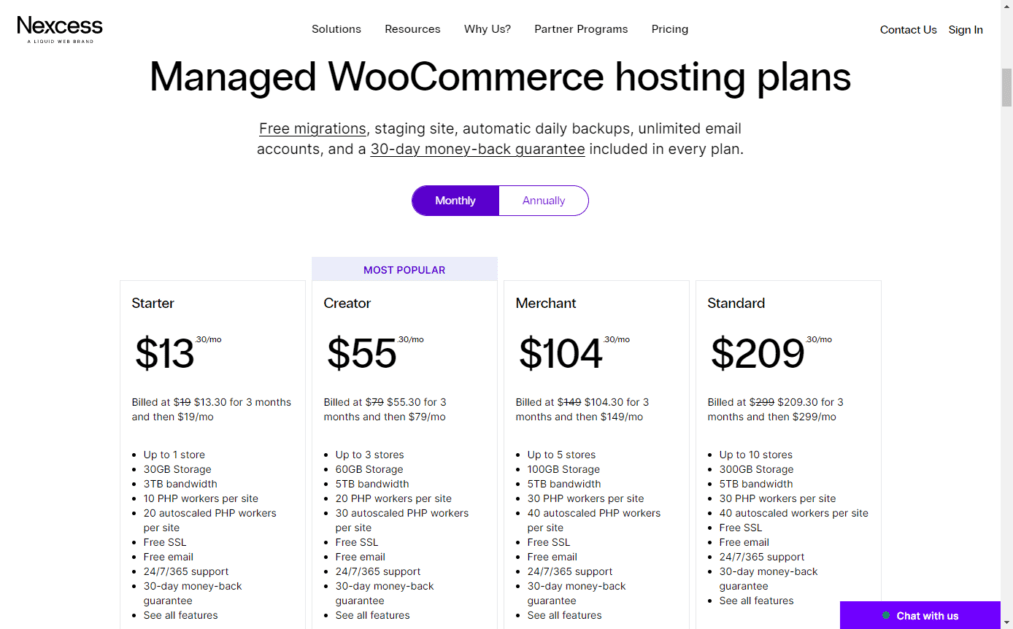
Pricing: Before discounts and promotions, hosting packages start at $19/month.
Plans include:
- Starter ($19/month): Up to one store with 30 GB storage and up to 500 orders per hour
- Creator ($79/month): Up to three stores with 60 GB storage and up to 1,000 orders per hour
- Merchant ($149/month): Up to five stores with 100 GB storage and up to 2,500 orders per hour
- Standard ($299/month): Up to 10 stores with 300 GB storage and up to 3,000 orders per hour
- Growth ($549/month): Up to 20 stores with 500 GB storage and up to 5,000 orders per hour, plus Glew.io analytics
- Enterprise ($999/month): Up to 30 stores with 800 GB storage and up to 10,000 orders per hour with Glew.io
Pros
- Integrated CDN
- Automatic image compression
- Auto-scaling handles high-traffic spikes
- Daily website backups
Cons
- No free domain
- No standard moneyback guarantee – monthly options will be refunded if canceled early. Prepaid plans will not.
- A dedicated IP address add on is not available on lower-tier plans
2. WPMU
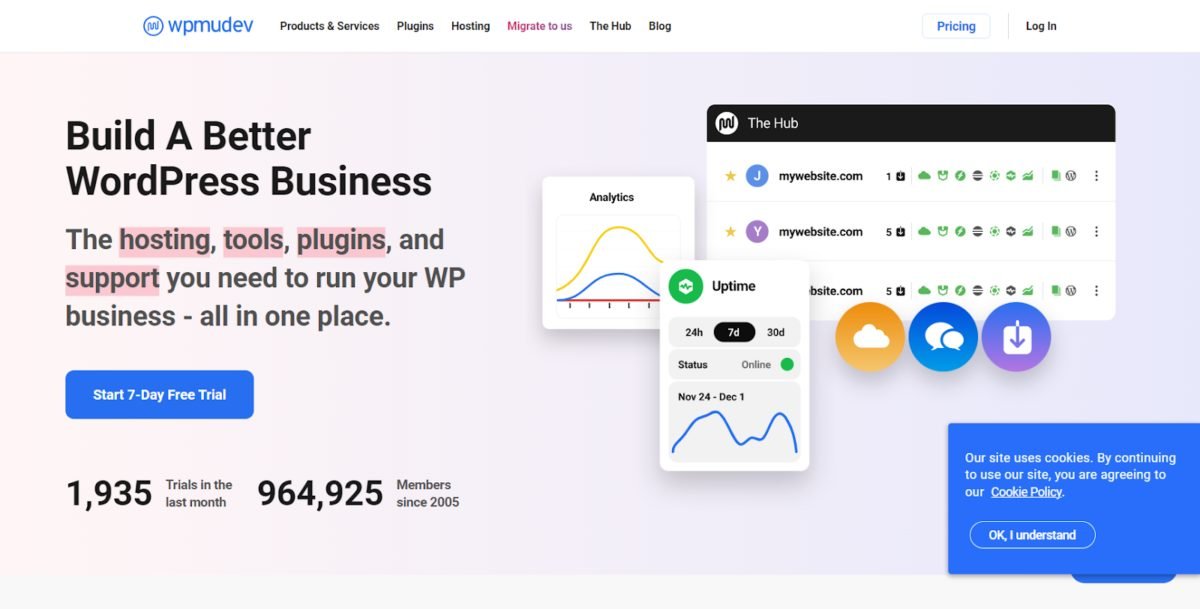
WPMU Dev launched years ago as a plugin, establishing a reputation as a premier source of multisite and network plugins.
As they’ve grown, they added a hosting product. They bundle hosting with their plugins.
WPMU Dev is a hybrid product that combines cloud hosting and WordPress hosting. You get to choose the data center where your website is hosted. There are data centers in the US, Canada, UK, India, Singapore, Germany, and the Netherlands.
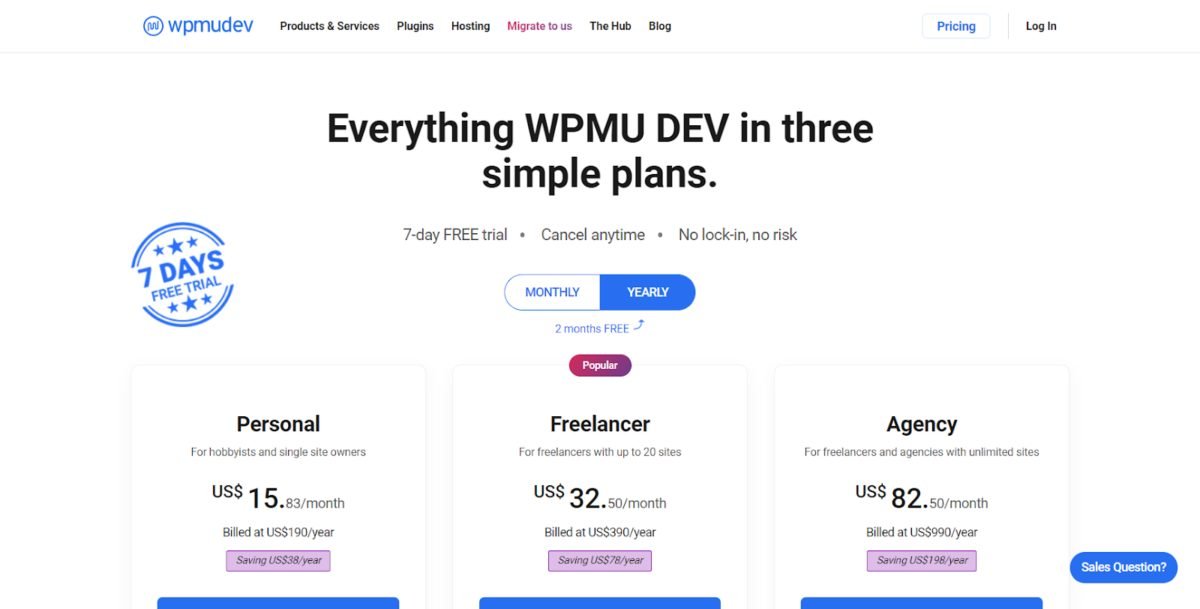
Pricing: Starts at $19/month with a 7-day free trial. Annual plans get two months free.
Plans include:
- Personal ($19/month): One site and all 11 pro plugins, 10 GB Smush CDN bandwidth, SEO tools.
- Freelancer ($39/month): Up to 20 sites, and all 11 pro plugins, 100 GB Smush CDN bandwidth, and SEO tools, with advanced features including a white label client portal, teams with up to five users, white label plugins and client reports, with $12/month hosting credit for an additional site for free on dedicated hosting
- Agency ($99/month): Unlimited sites and all 11 pro plugins, 250 GB Smush CDN bandwidth, a white label client portal, teams with unlimited users, white label plugins and client reports, with $12/month hosting credit for an additional site for free on dedicated hosting
Pros
- Unlimited 24/7 live support
- Plugins for security, image optimization, speed, and SEO
- Dedicated IP addresses
- Built-in analytics
Cons
- Reporting discrepancies in the backend
- Some reps have trouble with resolving speed issues that pop up in Google Speed Insights
3. SiteGround

If you’re looking to build with WooCommerce, then SiteGround is a great choice. It comes with a one-click installation, so you can get your online store up and running within a matter of minutes.
There’s a staging site available to help you build your site before anything goes public and make changes after the site goes live without affecting the live version.
In addition to WordPress hosting, SiteGround offers shared hosting, cloud hosting, and reseller hosting.
As your business grows, you can scale your hosting without having to migrate your site to another provider.
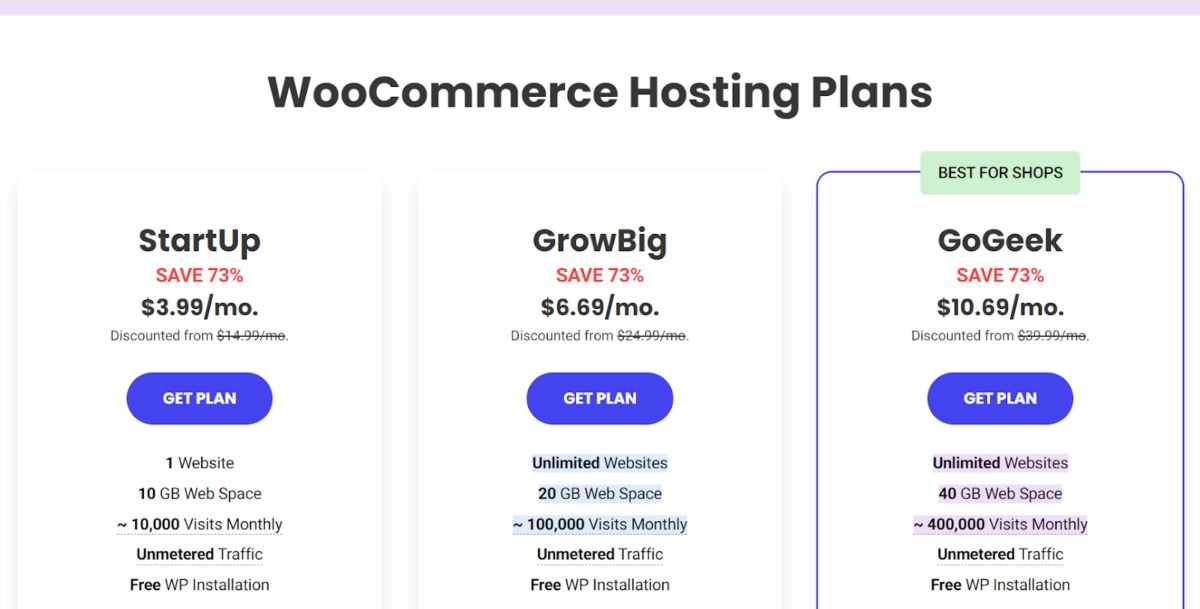
Pricing: Starts at $10.49/month with a 3-year commitment. Sometimes, the company runs specials that make a 12-month commitment more affordable, with pricing at $3.99/month.
Plans include:
- StartUp ($14.99/month): 1 website with 10 GB storage space, ~10,000 monthly visits, unmetered traffic, free WP Installation and Migrator, WordPress auto updates, free SSL, daily backup, free CDN, free email accounts, enhanced security features, ecommerce functionality, managed WordPress, unlimited databases, out-of-the-box caching
- GrowBIg ($24.99/month): Same as above, except unlimited websites, 20 GB web space, and ~100,000 visits monthly, plus on-demand backup copies, staging, and 30% faster PHP
- GoGeek ($39.99/month): Recommended for ecommerce projects, this plan offers everything in the GrowBig plan plus: 40 GB web space, ~400,000 visits monthly, GitHub, white-label clients, free private DNS, the highest tier of dedicated resources, and priority support.
Pros
- World-class support
- 30-day money-back guarantee
- 99.99% uptime guarantee
- Free daily backups and restores are available on all plans
Cons
- Only offers Linux based servers
- One of few web hosts that don’t offer advertising credits to new customers
4. Hostinger

Hostinger is a web hosting company that began as a free hosting provider in 2007. Over the years, they’ve evolved to offer additional services. They are known for their cheap ecommerce hosting.
Beyond paid shared hosting, Hostinger also offers WordPress hosting with a site builder, a cloud hosting plan, and VPS hosting. One thing that sets them apart is they also offer Minecraft hosting – which is great for gamers.
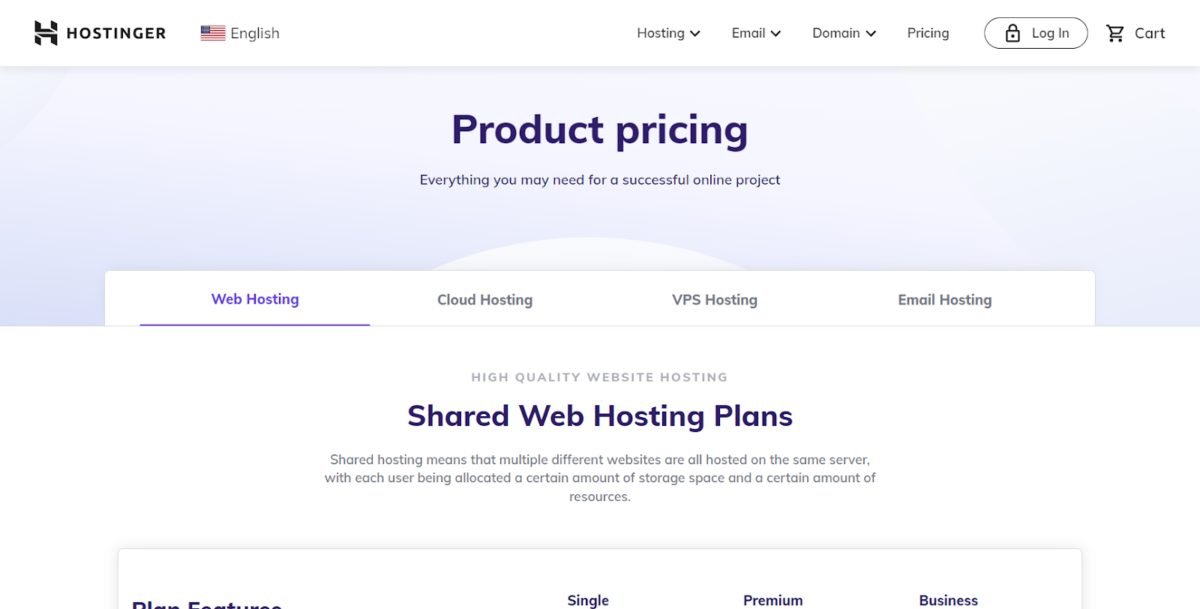
Pricing: Shared hosting starts at $1.99/month. Clouding hosting plans start at $9.99/month. VPS hosting starts at $2.99/month. Emailing hosting starts at $0.99/month. The lowest prices require a 48-month commitment.
Shared plans include:
- Single ($9.99/month on a month-to-month agreement, plus a $4.99 setup fee): 1 website, 30 GB storage, 100 GB bandwidth, ~10,000 monthly visits, 2 MySQL databases, free SSL, and 1 email address. This plan does not include free domain registration or daily backups, but you’ll get weekly backups.
- Premium ($11.99/month, as above): 100 websites, 100 GB storage, ~25,000 monthly visits, unlimited bandwidth, unlimited databases, free email, free domain, weekly backups, managed WordPress and WordPress acceleration, with GIT access and SSH access.
- Business ($16.99/month, as above): 100 websites, 200 GB storage, ~100,000 monthly visits, unlimited bandwidth, unlimited databases, free email, free domain, daily backups, managed WordPress and WordPress acceleration, Cloudflare CDN, with GIT access and SSH access. You’ll also get access to a WordPress staging environment.
Pros
- Affordably priced
- 30-day money-back guarantee
- Free domain
- Free website builder with Zyro
Cons
- No phone support
- Intermittent uptime with shared and WordPress hosting
- Lower tier WordPress hosting plans lack CDN and automatic backups
5. Dreamhost
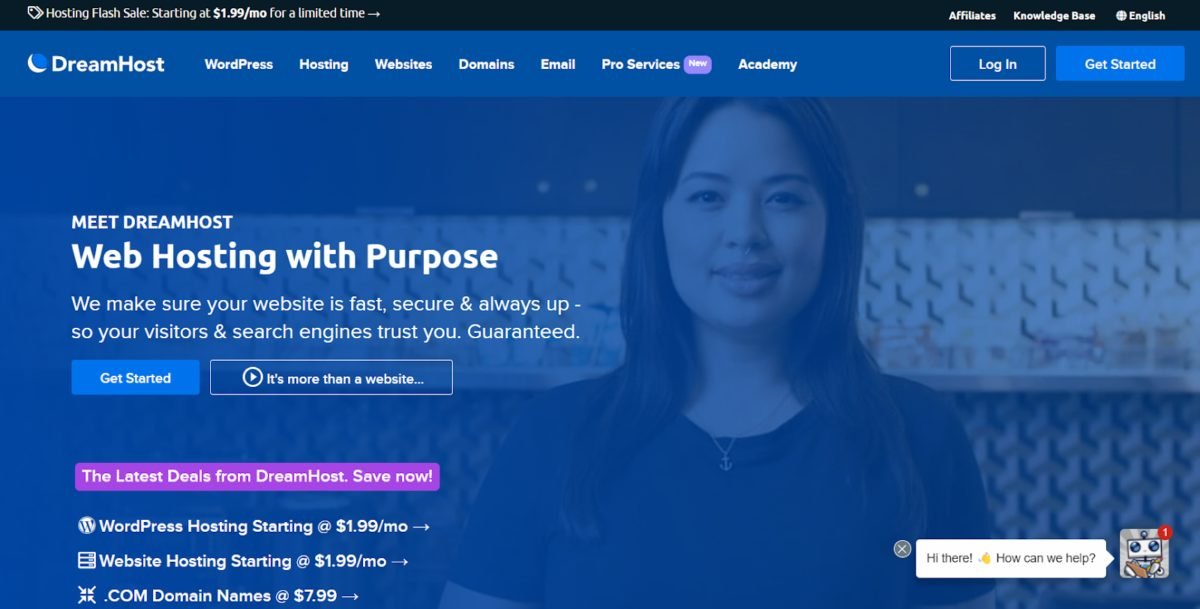
Dreamhost is another well-known web hosting provider with options for ecommerce businesses. Dreamhost is one of the few web hosts that allow for monthly billing rather than requiring annual commitments.
The monthly billing means that you can cancel your account at any time without penalty. You’ll pay more overall, but it’s great for people who don’t have a budget to invest in a year or more of service at once.
One thing that separates Dreamhost from other ecommerce hosts is the 100% uptime guarantee. If your site goes down at any time, you’ll get a refund for the amount of time it was down.
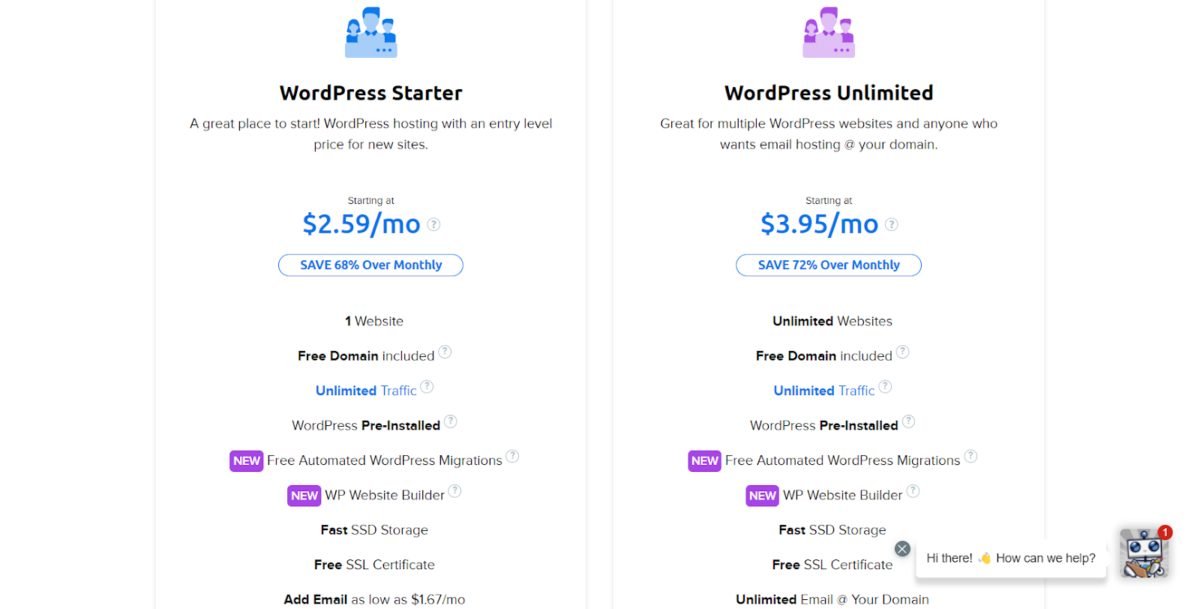
Pricing: WordPress hosting starts at $1.99/month with promotional pricing (regularly $7.99/month). WooCommerce hosting starts at $12/month with promotional pricing (regularly $19.95/month).
Plans include:
- WordPress Basic Starter ($7.99/month): 1 website with a free domain included on annual plans, unlimited traffic, free automated WordPress migrations, WP website builder, free SSL certificate, add email for as low as $1.67/month.
- WordPress Basic Unlimited ($10.99/month): Same as above, except unlimited websites (only one free domain included) and unlimited email.
- DreamPress ($19.95/month): Built for ~100,000 monthly visitors, unlimited email, 30GB storage, unmetered bandwidth, 1-click staging, on-demand and daily backups, free automated WP migrations, WP website builder
- DreamPress Plus ($29.95/month): Same as above, except it’s built for ~300,000 monthly visitors and comes with 60 GB storage. It also includes Jetpack Professional and unlimited CDN.
- DreamPress Pro ($79.95/month): Same as above, except it’s built for ~1 million+ monthly visitors and comes with 120 GB storage. You’ll also get 24/7 priority WordPress support.
- VPS WordPress Basic: ($15/month): 1 GB RAM, 30 GB storage, unlimited websites, unlimited traffic, free SSL, and unlimited email. You also get reseller and sub-account features.
- VPS WordPress Business: ($30/month): Same as above, except you get 2 GB RAM and 60 GB storage.
- VPS WordPress Professional: ($60/month): Same as above, except you get 4 GB RAM and 120 GB storage.
- VPS WordPress Enterprise: ($120/month): Same as above, except you get 8 GB RAM and 240 GB storage.
Pros
- Easy to use dashboard
- Unmetered bandwidth
- Free domain name registration with annual plan and above
- 100% uptime guarantee with refunds for any downtime
- Money-back guarantee
Cons
- Limited server locations compared to competitors
- Email accounts aren’t included with the starter plan
- No phone support
6. Bluehost
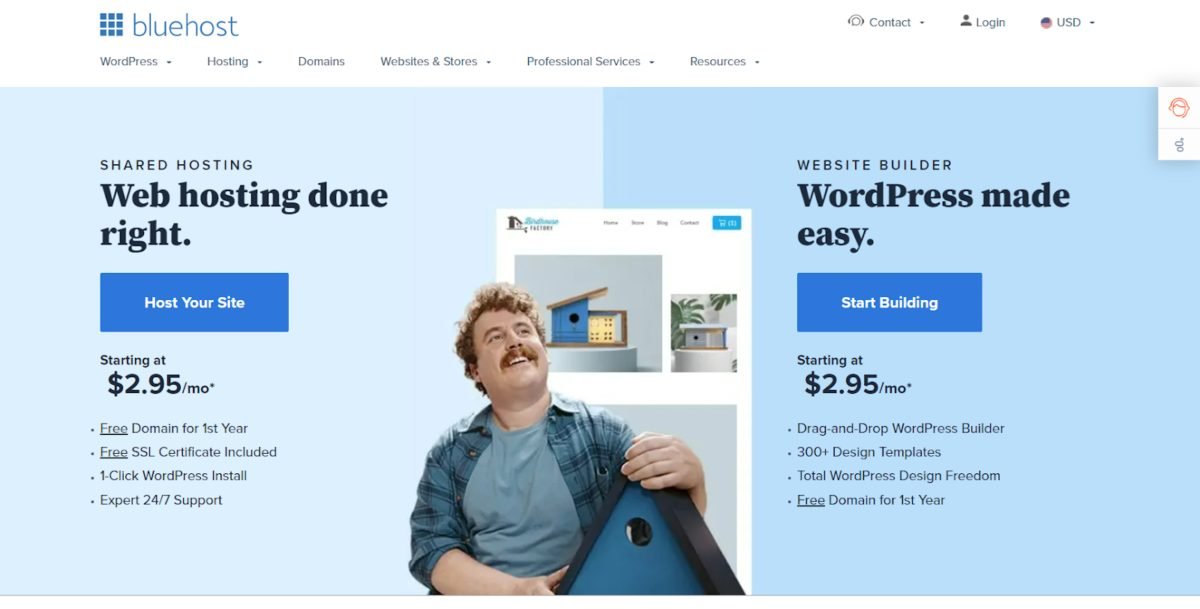
Bluehost is a well-known hosting provider that’s WordPress friendly. It is beginner-friendly, too, making it a perfect option for those just getting started with their first ecommerce site or online store.
Bluehost offers hotlink protection, a free SSL certificate, Secure Shell access (SSH), a free CDN, automatic daily backups, and a free domain for a year.
Pricing: Starts at $2.95/month with a 3-year commitment for shared hosting.
WooCommerce Plans include:
- WooCommerce Standard ($29.95/month before discounts for term commitment): Free domain name, unmetered bandwidth, email marketing, unlimited products, Jetpack Free, customer product reviews, website traffic analytics, 24/7 customer support, payment processing with one-click install, manual order creation, discount codes, CodeGuard Backup Basic (first year free) and 30 days of Office 365
- WooCommerce Premium ($49.95/month before discounts for term commitment): Same as above, plus Jetpack Premium, online bookings, and appointment scheduling, subscriptions, product customization, local and country tax management, free domain privacy and protection, CodeGuard Basic included.
Pros
- Unlimited bandwidth
- Plenty of storage on all plans
- Easy to use
- Free domain for the first year
Cons
- No service level agreement (SLA) that guarantees minimum uptime
- Entry-level plans lack quality backup options
- No international servers
- Lots of upsells
- Speed performance isn’t as good as other ecommerce hosting providers
7. A2 Web Hosting

A2 Web hosting is one of the best ecommerce hosting providers when it comes to speed. Though the standard plans are fast, they also offer a Turbo and Turbo Boost plan that adds even more speed to your site’s loading time.
A2 Hosting offers shared hosting, cloud hosting, and WordPress hosting plans, so you can choose what works best for your needs and budget. The cloud plans are unmanaged VPS plans. Reseller plans are also available.
A2 plans include a free Jetpack license to add security, spam protection, and speed to your site.
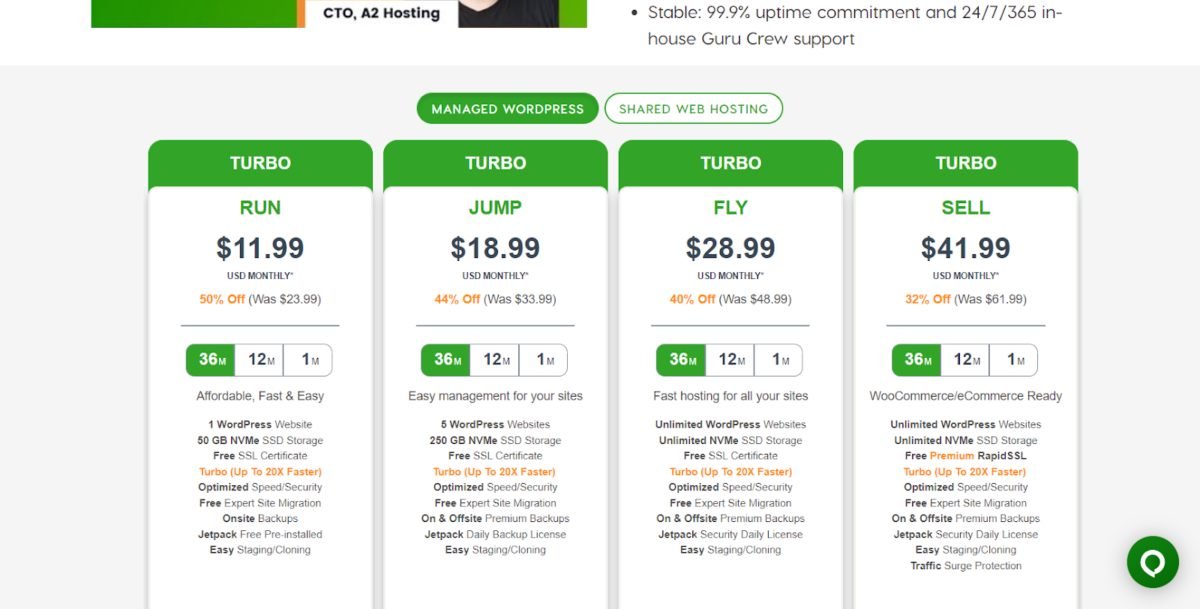
Pricing: Starts at $23.99/month for WordPress hosting. Sometimes, promotions can bring this to as low as $11.99/month.
Plans include:
- Run ($23.99/month): 1 WordPress website, 50 GB storage, free SSL certificate, optimized speed and security, free site migration, onsite backups, Jetpack free, and easy staging/cloning.
- Jump ($33.99/month): Same as above, except 5 WordPress websites, 250 GB storage
- Fly ($48.99/month): Same as above, except unlimited websites and storage
- Sell ($61.99/month): Same as above, except unlimited websites and storage. The difference here is the additional RAM (16 GB compared to 8 on the Fly plan and 4 on Run and Jump) built to use as reseller hosting
Pros
- Developer friendly plans
- Anytime money-back guarantee
- Free email hosting with unlimited email addresses. Competitors limit the number of email addresses, or charge for email hosting separately.
Cons
- Expensive ecommerce plans
- No shared ecommerce hosting
- Uptime is only 99.95%
- No free domain name
8. WPX
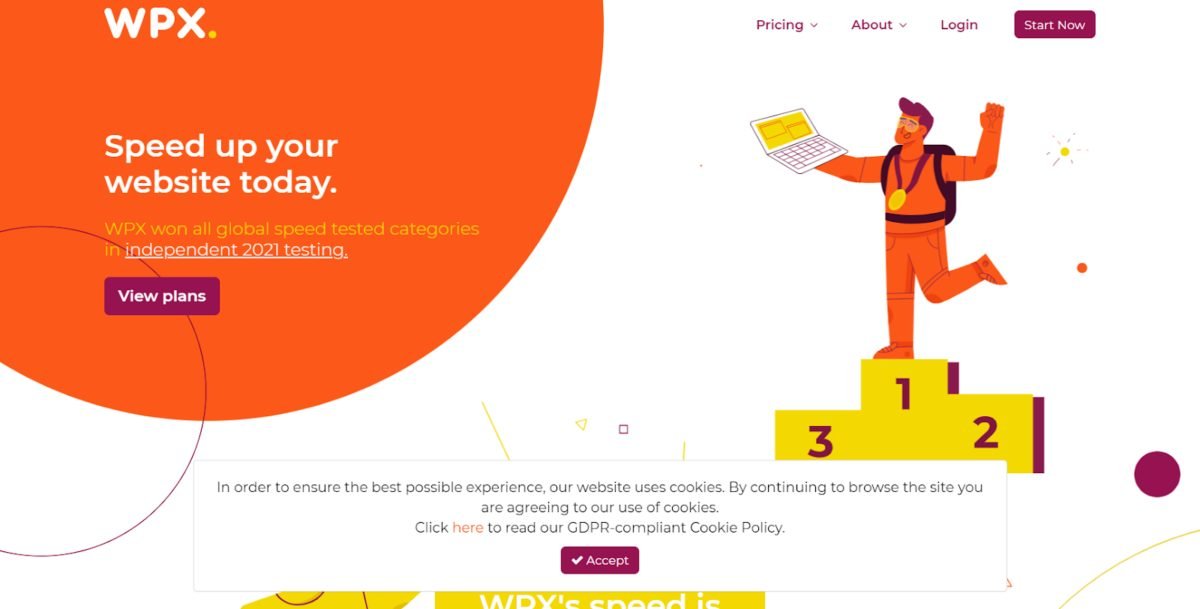
WPX is a WordPress web hosting company that offers free speed optimization, a free CDN, free malware detection and removal, and free site fixes if your online store ever goes down. All plans come with a 30-day money back guarantee and 99.95% uptime.
When you setup your hosting plan, you can choose to use an existing domain, or to purchase a new one for $13.99/year with free forever domain name privacy protection.
You’ll also be able to choose your hosting location – Chicago for the U.S., London for the U.K, and Sydney for Australia.

Pricing: Starts at $24.99/month, with two months free if you pay for an annual plan. Sometimes, promotions can take the price down to as little as $8.75/month. The entry-level plan allows you to host up to five ecommerce sites.
Plans include:
- Business ($24.99/month): Up to 5 websites, 10 GB storage, 100 GB bandwidth
- Professional ($49.99/month): Up to 15 websites, 20 GB storage, 200 GB bandwidth
- Elite ($99.99/month): Up to 35 websites, 40 GB storage, unlimited bandwidth
Pros
- Competitive pricing
- Works for WordPress and other content management systems
- Enterprise level DDoS protection
- Malware scanning and removal
- Supports email
Cons
- Interface lacks features
- No phone support available (but a 30 second average support response via live chat can make up for that)
- Only three server locations
9. InMotion Hosting

For a growing ecommerce store looking for a VPS hosting provider, InMotion could be the perfect solution. However, they have slower overseas speeds, so it’s best suited for any ecommerce business based in the United States.
If your site is too big for shared hosting, but you don’t have the budget for a fully dedicated solution, then VPS is the perfect compromise.
The company also offers shared hosting and WordPress hosting. While it’s a good company, it’s worth mentioning that it is an expensive ecommerce web host. The The cheapest option is more expensive than all of Hostinger’s plans.
If you’re starting with shared hosting, you can host 100 Hostinger websites for less than the cost of an InMotion plan.
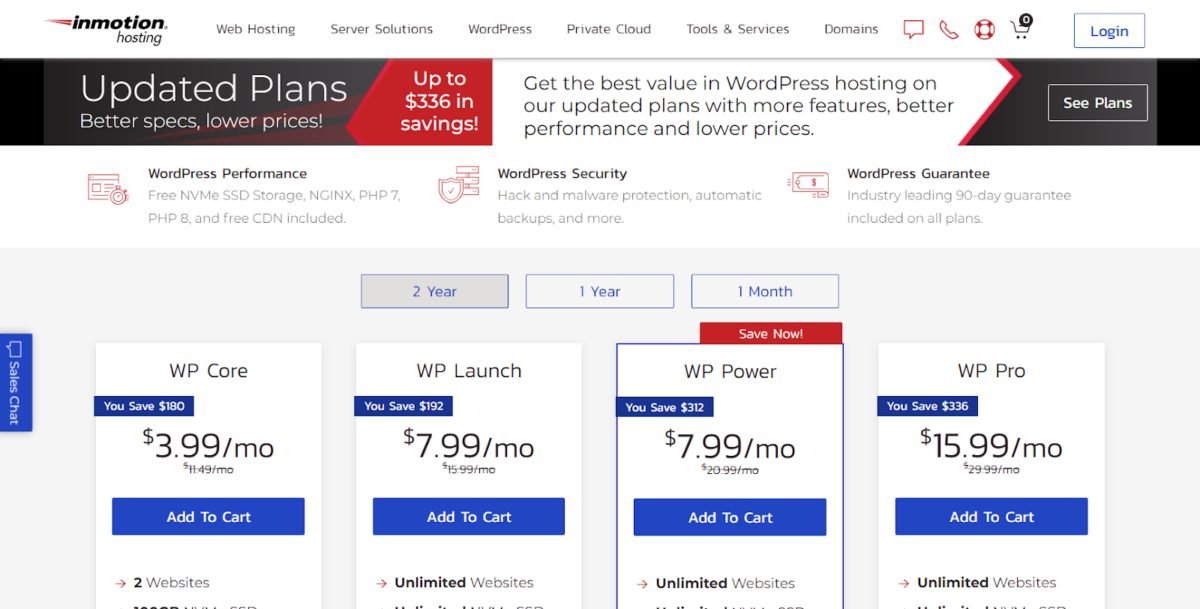
Pricing: Starts at $11.49/month for WordPress hosting. Sometimes, promotional discounts bring this down to as low as $3.99/month. WordPress hosting is only available for a one, two, or three year commitment. Monthly plans are not available.
Plans include:
- WP Core ($11.99/month): 2 websites, 100 GB storage, 10x WP performance, free lifetime SSL, unlimited bandwidth, 10 email address, security suite, marketing tools, native backups and migrations, TotalCache support, 2 PHP workers per site
- WP Launch ($16.99/month) Same as above, except unlimited websites and storage with 20x WP performance, unlimited email addresses, 3 PHP workers per site, advanced caching, and a JetPack personal license.
- WP Power ($21.99/month) Same as the WP Launch plan, except 30x WP performance, 4 PHP workers per site, and a dedicated Opcode cache pool
- WP Pro ($30.99/month) Same as the WP Launch plan, except 40x WP performance, 6 PHP workers per site, pro level support and a dedicated IP address
Pros
- 24/7 customer support
- 90-day money back guarantee
Cons
- No Windows hosting available, only Linux
- Average uptime guarantee
- All prices are over $5 before discounts
- Only two US data centers – one on the east coast and one on the west. No international data centers
10. Cloudways
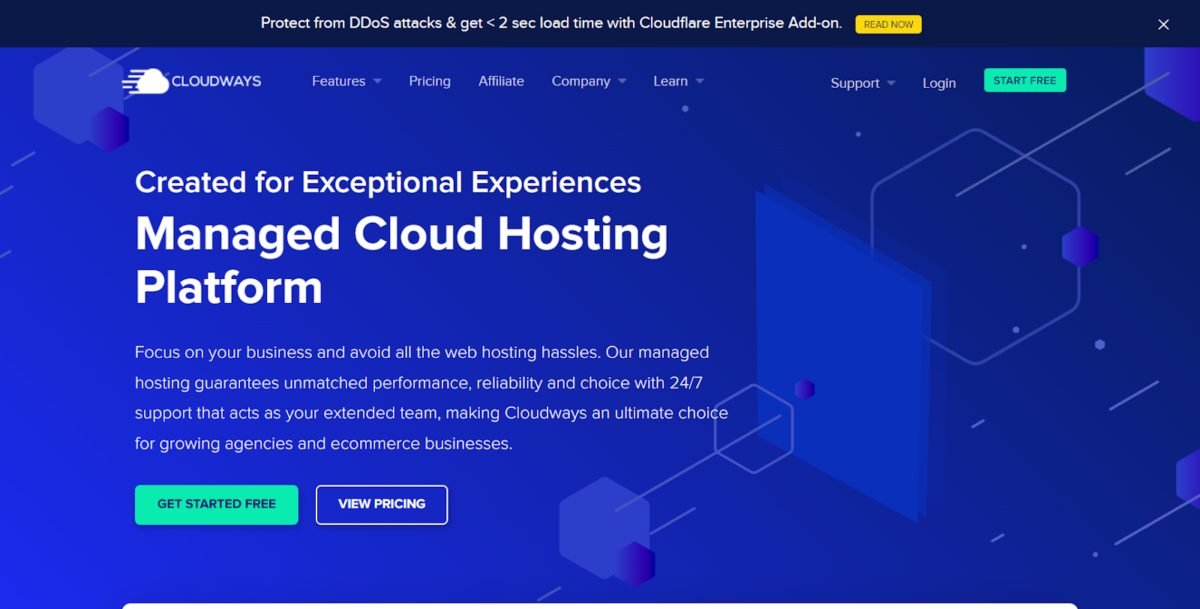
Cloudways offers a managed cloud hosting platform. It offers support for WordPress, WooCommerce, Adobe Commerce, Laravel, and PHP.
Since WooCommerce runs on WordPress, you may wonder about the differences between the two types of hosting. The biggest difference is in the performance requirements. WooCommerce hosting packages are tailored specifically to performance requirements to ensure your online store works well for customers.
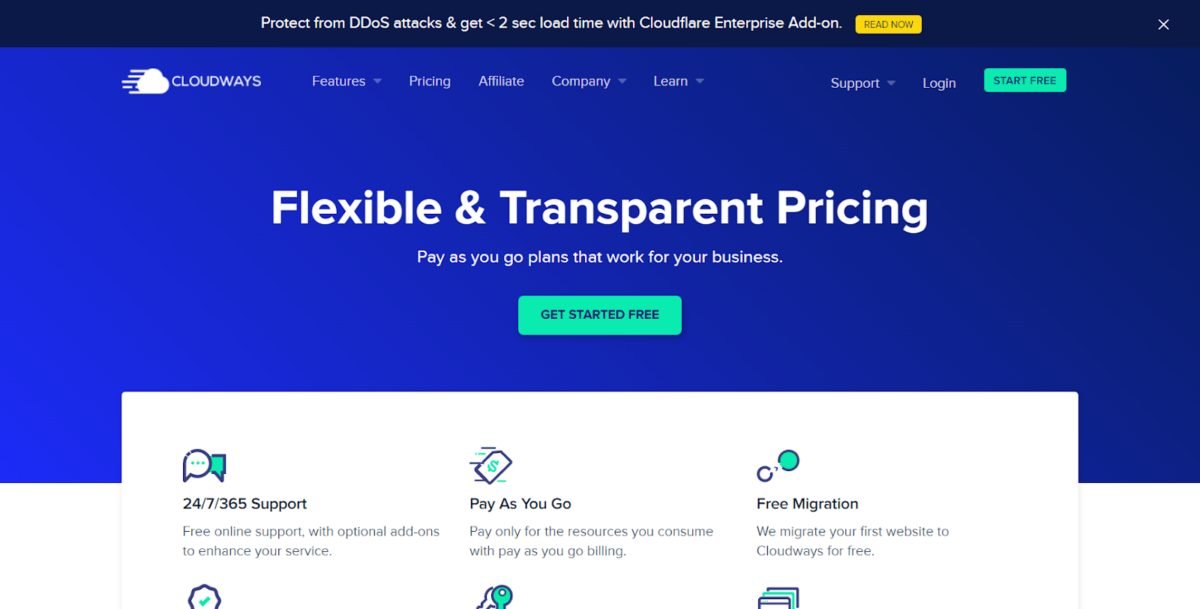
Pricing: Starts at $10/month for standard plans and $12/month for premium plans. These are pay as you go plans. You can also pay hourly, with standard plans starting at $0.0139/hour and premium plans starting at $0.0176/hr.
- All plans include:
- Free SSL and migration
- 24/7/365 support
- Cloudflare add-on
- Dedicated firewalls
- Automated backups and 24/7 real-time monitoring
- Team management
- Unlimited application installation
- Staging environment
- Regular security patches and auto healing
- SSH and SFTP access
- $10/month: 1 GB RAM, 1 core processor, 25 GB storage and 1 TB bandwidth
- $22/month: 2 GB RAM, 1 core processor, 50 GB storage and 2 TB bandwidth
- $80/month: 8 GB RAM, 4 core processor, 160 GB storage and 5 TB bandwidth
Pros
- All plans include 24/7/365 support and 24/7 real-time server monitoring
- All plans include Cloudflare CDN add-on
- 62 data centers across 15 countries
- Scaling to handle traffic surges
- Unlimited website installations
Cons
- Not suited for beginners
- Many add-ons have an extra cost, including email.
- Plesk and cPanel are not an option, Cloudways uses its own platform to manage applications.
- No root access or server modifications
- If the server is deleted during the free trial, your trial automatically ends.
11. Rackspace
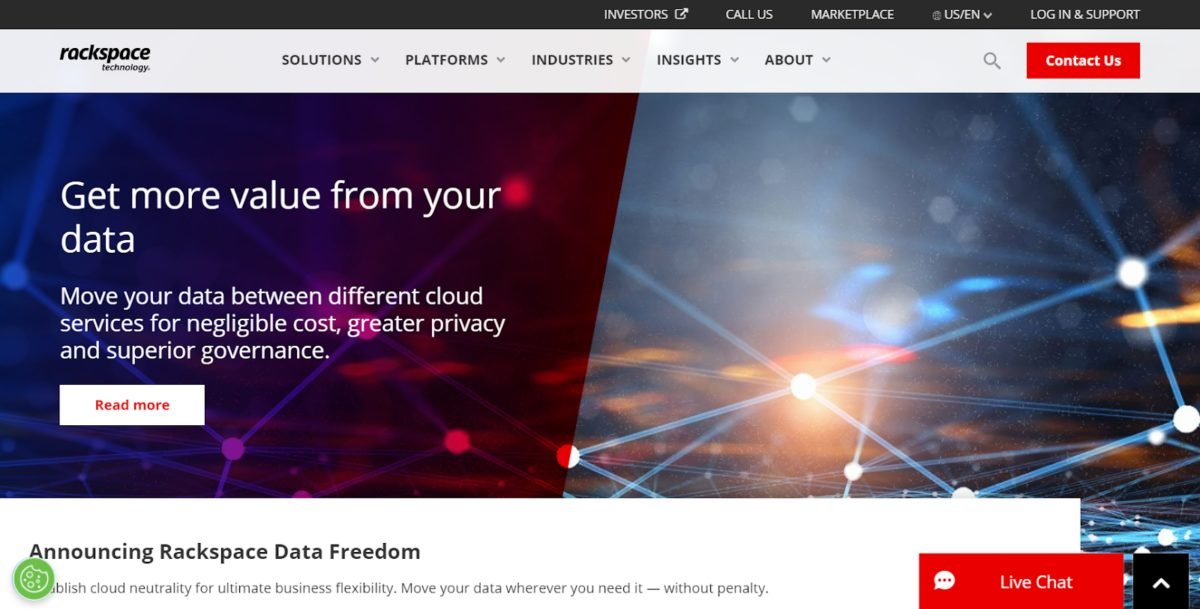
Rackspace is a managed cloud hosting provider with many powerful features. It is one of the leading hosting companies with a global presence. Founded in 1998, it has customers in 120 countries.
You can choose between the public cloud, a private cloud, or a hybrid cloud.
The public cloud is great for businesses that want to get started and keep growing. Pricing is based on your specific configuration. The private cloud gives you the same thing you have with the public option, but control, security, and performance of a dedicated solution. It’s an advanced optimized hosting solution that is much more expensive.
This company only offers dedicated solutions, so it’s great for sites that expect large traffic volumes or rapid growth.
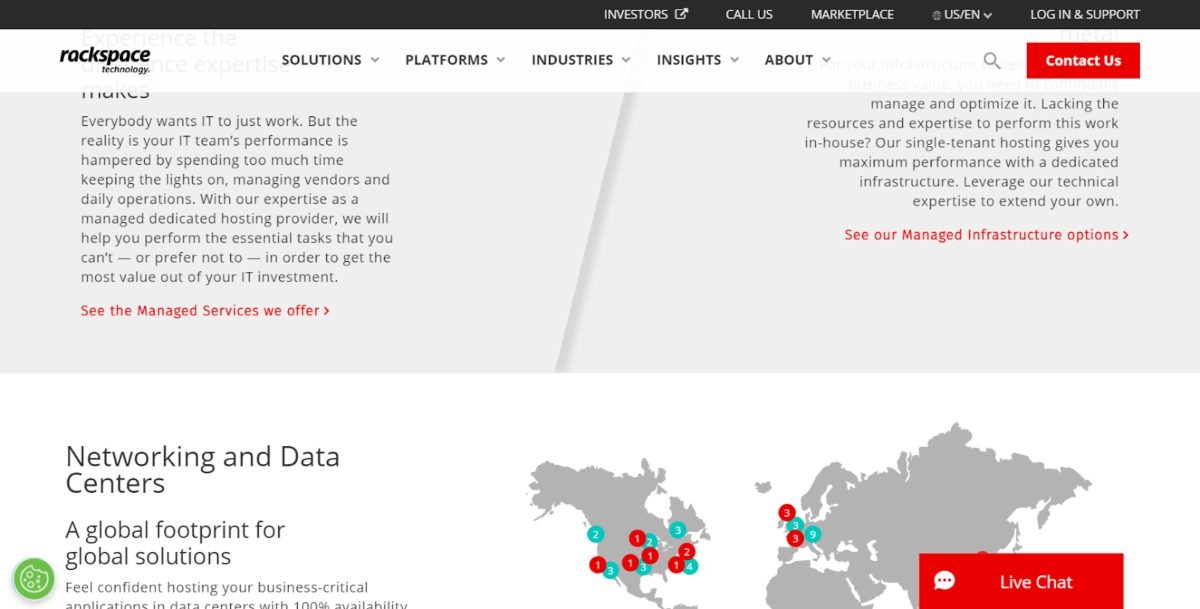
Pricing: Free Quote Required, but according to other product reviews, the cheapest plan starts at $23/month.
Pros
- Tailored web hosting prices
- 24/7 support
- Amazing infrastructure
Cons
- No instant setup
- Best for larger websites
- Fairly expensive, especially compared to other options on this list
FAQs
Which Ecommerce Hosting Provider is Best for Your Business?
Only you can answer this question, based on what your online store needs. Just like there are multiple ecommerce platforms out there to choose from, each with their own pros and cons, you’ll have to choose the ecommerce host you believe will be best.
Hostinger is among the best for those on a budget, but it’s not the universal answer for all businesses. To get the best price with them, you have to commit to four years. If you’re just getting started, a 4 year commitment could be too much. The key is to compare all the ecommerce hosting plans within your budget, and opt for the one that gives you the best value.
These 11 ecommerce hosting options give you all the tools you need to be successful when launching your online business. You’ll have a reliable provider no matter which one you choose.









